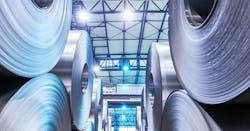Thyssenkrupp AG will cut as many as 2,500 office workers as Germany’s biggest steelmaker expands efforts to reduce costs and boost profit.
Administrative costs of 2.4 billion euros (US$2.7 billion) are “clearly too high” and will be lowered by 400 million euros by September 2020, the company said in a statement on Tuesday. That will result in the loss of 2,000 to 2,500 of the business’s 18,000 office workers over the next three years, with about half going from Germany.
The company’s shares jumped as much as 3.1% to 26.965 euros to the highest level since August 2011 after Bloomberg reported the news, and were up 2.7% by 12:32 p.m. in Frankfurt, leading Germany’s benchmark DAX index of major stocks.
Europe’s steel workforce shrank by about 20%, or almost 84,000 workers, from 2008 to 2015, as producers sought to reduce expenses and close unprofitable facilities after prices plunged.
While demand has begun to recover, the continent continues to produce more steel than it needs and Wolfgang Eder, the chief executive officer of Austria’s Voestalpine AG, predicts employment in the sector could fall another 20% in the coming decade.
Thyssenkrupp CEO Heinrich Hiesinger has sought to transform the Essen, Germany-based company into a diversified industrial manufacturer since he took over in 2011, with a plan to raise earnings before interest and taxes to at least 2 billion euros. While the company, with roots dating to 1811, has earned more from elevators than steel in the past six years, Hiesinger said in 2016 that it was struggling to reach the profit target.
Thyssenkrupp said in April it was seeking to reduce expenses at its steel business by 500 million euros in three years, including by closing parts of some production facilities, and announced a similar program last month for its Industrial Solutions unit.
Administrative cost cuts will be positive for the company as they’re less likely to be passed on to customers, analysts at Jefferies International Ltd., led by Seth Rosenfeld, said in a note to clients, reiterating their buy recommendation.
Thyssenkrupp’s management has been in talks with Tata Steel Ltd. for more than a year on proposals to place the two companies’ European steel businesses into a joint venture. Thyssenkrupp agreed in February to sell its Brazilian steel plant to Ternium SA, completing the exit from its Steel Americas unit, the worst investment in its history.
By Tino Andresen
About the Author
Bloomberg
Licensed content from Bloomberg, copyright 2016.
